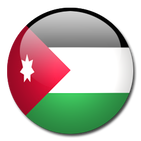International Headteacher
Menu
Full name: The Hashemite Kingdom of Jordan
Population: 6.5 million (UN, 2010)
Capital: Amman
Area: 89,342 sq km (34,492 sq miles)
Major language: Arabic
Major religion: Islam
Life expectancy: 72 years (men), 75 years (women) (UN)
Monetary unit: 1 Jordan dinar = 1,000 fils
Main exports: Phosphates, fertilisers, agricultural products
GNI per capita: US $4,390 (World Bank, 2010)
Internet domain: .jo
International dialling code: +962
Population: 6.5 million (UN, 2010)
Capital: Amman
Area: 89,342 sq km (34,492 sq miles)
Major language: Arabic
Major religion: Islam
Life expectancy: 72 years (men), 75 years (women) (UN)
Monetary unit: 1 Jordan dinar = 1,000 fils
Main exports: Phosphates, fertilisers, agricultural products
GNI per capita: US $4,390 (World Bank, 2010)
Internet domain: .jo
International dialling code: +962
|
The Hashemite Kingdom of Jordan is a small country with few natural resources, but it has played a pivotal role in the struggle for power in the Middle East.
Jordan's significance results partly from its strategic location at the crossroads of what most Christians, Jews and Muslims call the Holy Land. It is a key ally of the US and, together with Egypt, one of only two Arab nations to have made peace with Israel. The desert kingdom emerged out of the post-World War I division of the Middle East by Britain and France. The population at that time was largely made up of tribes which had taken part in the Great Arab Revolt against the Ottoman Empire. Today, those original inhabitants - known as East Bank Jordanians - are outnumbered by the descendants of Palestinian refugees from Israel and the West Bank. The first ruler of Jordan, the Hashemite Abdullah I, was born in Mecca and played a leading role in the Great Arab Revolt. The death in February 1999 of King Hussein, who ruled for 46 years, left Jordan still struggling for economic and social survival, as well as regional peace. His son, Abdullah II, who succeeded him to the throne, faces the task of maintaining stability while accommodating calls for reform. A blueprint for long-term political, economic and social change - known as the National Agenda - has yet to be implemented, and the Arab Spring popular revolts across the region have found some resonance in lower-key street protests in Jordan. Jordan's reputation as one of the region's safest countries was dealt a blow in late 2005 when dozens of people were killed in suicide bomb attacks on hotels in the capital. Iraq-based Islamic militants claimed responsibility. The king said Jordan had been targeted because of its location and its stances. Unlike many of the states in the region Jordan has no oil of its own. Its resources are limited to phosphates and agricultural produce. The economy depends largely on services, tourism and foreign aid, for which the US is the main provider. Jordan prides itself on its health service, one of the best in the region. |
information provided by www.bbcnews.co.uk

